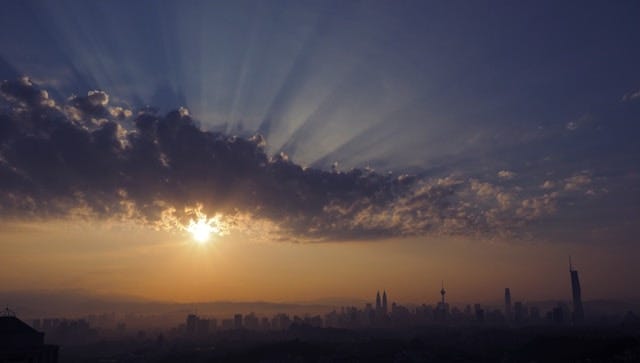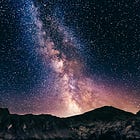Why conscious living is the key to happiness
plus the philosophy of the now and what freedom means.
I awoke just before dawn, something that rarely happened to me, a serial night owl. As I drew back the curtains across my studio’s entire wall of floor-to-ceiling windows, I was greeted by the sun rising over Kuala Lumpur’s skyline, its famous twin towers standing proudly in the distance.
Despite living here for almost a year, this is the first time I am watching a sunrise—a sunrise that marks my first day after quitting my conventional job. Inspired by my recent travel sabbatical, I realized that conventional work no longer fits my life vision. This epiphany led me to resign and embrace a path of independence, marking a stark departure from my previous breaks.
This set a trajectory for me - I no longer need to wake up to alarm clocks in the morning, and there is nowhere I need to be on weekdays. This sunrise was an anomaly, fueled by the thrill of a new chapter in life; the days followed were more of my natural rhythm.
I began working on projects according to my own schedule and had way more time to read, exercise, be with my friends and family, and travel. I have never felt so good since I started working more than five years ago.
Reflecting on this lifestyle in an epiphany post, I declared that this way of conscious living is ultimately for freedom. At that time, it meant freedom from society's expectations to work a “normal job” and the ability to do whatever I wanted, whenever I wanted.
But what exactly is conscious living? I've once described it as the battle between the first and second minds.
The first mind is where we go about our everyday lives on autopilot. Like when we go through our morning routine mindlessly, getting ourselves ready, commuting to work, and finding ourselves at the office to start the daily grind. All these unfold without us noticing the little joyful details that make up our lives. This is what I call auto mode.
The second mind, on the other hand, is fully conscious. It anchors us in the present moment and makes us aware of every action and its purpose. It is conscious of what it is doing and why it is doing it. This mind is really what we want to engage in whenever possible.
Meditation has taught me that we can, in some ways, bring forth our second mind. But our human mind is inherently fallible, often wandering aimlessly and uncontrollably. In my experience, with enough practice, one can learn to bring one's mind back to the present more easily.
But what is so important about the present? The now?
During one of my long meditation sessions in a Vipassana retreat, seated cross-legged in a garden within a Thai temple with gentle tree leaves rustling around me, my eyes flicked open to a realization: 'There is no time.'
After more contemplation, I concluded that there is no past, nor is there a future; there is only now. Now is all we have. Therefore, we should live every moment consciously, not letting the past haunt us or the future worry us. By enjoying and being mindful of each moment, we will lead a meaningful and happy life.
In the present moment we already have more than enough conditions for our happiness. We just need to stop and recognize them in order to touch true happiness. - Thich Nhat Hanh1
Over a decade later, I found that my priorities in life have changed; this tends to happen when you start making tiny humans of your own. Conscious living is still, if not more important than ever, with the need to impart it to my children.
But I no longer chase after this beautiful rush of consciousness when traveling on the road or the freedom to do whatever my heart wishes.
I do miss them, no doubt, but now I focus on capturing the sense of wonder in everyday life, rediscovering the charm in familiar surroundings, treasuring my loved ones and cherishing my service to them, while living each day consciously and deliberately.
The really important kind of freedom involves attention and awareness, discipline, and being truly to care about other people and sacrifice for them over and over in myriad petty, unsexy ways every day. That is real freedom. – David Foster Wallace2
Embracing the long hours of breastfeeding in the night, relishing the hugs my kids give me as if they haven’t seen me for years even though it’s only been hours, savoring the warmth of my husband next to me in the night, and marveling at the sunset from my balcony amid the lively chaos of children—these simple acts of daily life consciousnesses offer a profound yet different kind of freedom. They allow me to experience true happiness in seemingly ordinary moments.
If you enjoyed this post, you might also be interested in:
I’d love to hear from you:
When did you last operate on autopilot, and how did it make you feel?
Do you have a mindfulness practice that helps anchor you in the present moment?
What does freedom mean to you now? Has it changed?
https://plumvillage.org/about/thich-nhat-hanh/interviews-with-thich-nhat-hanh/an-italian-journalist-reports-from-plum-village
David Foster Wallace, in his book This Is Water: Some Thoughts, Delivered on a Significant Occasion, about Living a Compassionate Life.






Rachel, Hi I am a new subscriber. I am in the process of creating a print and online publication called The Zest of the Lemon - capturing the best slices of life. I am gathering a variety of short pieces, and think this piece might fit. I encourage you to submit. You can learn more on my Substack. Thanks, D
I love the teachings of Thich Nhat Hanh! Stumbling upon one of his book many years ago changed my life a bit and I owe him many realizations about my life (and the fact that the present is the only thing we have, as you wrote). I also like what Sam Harris said in one of his speeches, which was along the lines of "we live life in a constant state of emergency". That kinda stung! But again, it facilitated the transition toward the 'second mind-mode' :)